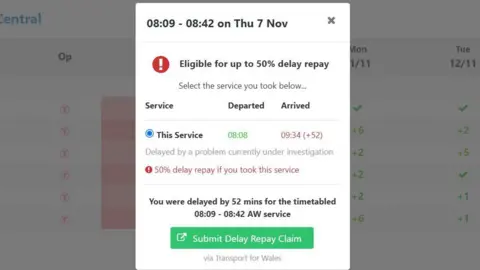The man holding Britain's railways to account
 Supplied
SuppliedWhile waiting for a delayed train on a cold railway station platform back in 2016 a 30-something tech enthusiast had his big idea. The scene of all-consuming misery sparked his concept for a more rewarding type of platform, one based in cyberspace, with the power to drive news stories and generate questions in Parliament.
Mark Wherity often used to find himself stuck at railway stations waiting around for delayed trains. It eventually led him to wonder if it was going to be a regular inconvenience, but had no easy way to find out.
On one occasion he decided to take out his smartphone and "just had a look to see whether there was an answer to that question", he recalls.
"I looked around websites and I found a few that showed the departure times or arrival times of recent trains, but there was nothing that showed how is my station [performing] or how is this particular journey."
The 37-year-old IT professional from Hertfordshire then set about making On Time Trains (OTT), a free-to-use website that scrapes data from National Rail systems to provide analysis on service punctuality and cancellations - something not provided by any official platform.
Data from the site recently showed Manchester Victoria had the highest rate of cancellations out of the 100 busiest stations in Britain, with about one in 10 of scheduled stops cancelled between January and November.
Northern, which manages Manchester Victoria, said it had been working hard to address train crew availability issues, to improve reliability.
It said a rest day working agreement had been reached with drivers and it would continue to work with the RMT union to find a "new way forward" after conductors recently rejected an offer relating to Sunday working.
The RMT said it was seeking further talks with the company.
OTT's station view function gives users the ability to see how their station ranks compared to others in Britain, giving detailed data on how delayed its trains tend to be and a performance score.
"My focus was shining a light on a space that I felt was underrepresented," Mark says.
"I think it [OTT] gives people licence to grumble when their train is late because their station is terrible and so they're right to complain, versus a station which is very highly ranked.
"Let's say it's your journey to work and maybe you always get the 8am train. You can very quickly see in the journey view a train compared to the trains before and after it.
"You might find another train that runs 10 minutes before is much more reliable."

The making of OTT took Mark a year, and saw various prototypes tested and feedback gained to find the best way to present the data.
Since it launched in February 2017, OTT has provided a source of stories for the BBC, The Sunday Times, Channel 4 documentaries and more.
The platform has been referenced both in evidence submissions for the Transport Select Committee and in Hansard - the verbatim report of what is said in Parliament.
"It's come a really long way, so I'm really pleased with how it's progressed," Mark says.
"It's fantastic... I never would have expected that the site would have been referenced this widely when I first built it."
Of the roughly 300,000 people who visit the site each year, many use the Delay Repay page, which allows users to make easier compensation claims for delayed trains under the nationwide Delay Repay scheme.
If you are delayed for any reason when you travel on a participating National Rail service you can claim compensation, but the thresholds differ between train companies.
It shows what the scheduled and delayed arrival times were for previous journeys and whether you could still have got to your destination within the delay threshold (e.g. less than 15 minutes late) by taking another service.
Adam, 48, from Cambridgeshire, commutes to central London several times a week. "Quite frequently, trains are delayed or cancelled," he says.
"At the time it's just a question of trying to get home as quickly as possible – not standing around on cold platforms for trains not to arrive."
He says On Time Trains has helped him to claim Delay Repay money more easily, and that since May 2023, he has been refunded around £500.
"My daily commute is £47 – as a proportion of that, that's quite a chunk of money."
Mark says the site helps people to avoid a lot of the "back and forth" involved with claims.
"[People] tell the operator how late it was, fill in the form, the operator will come back and say, 'You weren't, you were six minutes late rather than five minutes late'," he says.
 Supplied
SuppliedAnother feature of the site useful to London commuters is the annual London Commuter Station Rankings, which tells the story of which stations are the best-in-theory to commute from.
This looks at 30 major stations outside the M25, each within an hour's travel time of the capital and with more than a million pre-pandemic passenger journeys per year, and scores them based on performance, frequency, speed, and value.
Among the things it considers are if services arrive on time and without cancellations, how regular they are during peak times, how fast they are, and how expensive they are per mile.
"You could have a route where the trains are really expensive but very punctual... similarly, if there's another station over here where trains are similarly punctual, but almost half the price," Mark adds.
Last year, Chelmsford in Essex took the number one spot, where 88% of commuter services ran on time and only 1% were cancelled.
With an increase in the number of morning peak services compared to last year, passengers waited for an average of just 8 minutes on their way to and from London Liverpool Street.
